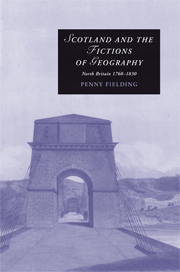Book contents
- Frontmatter
- Contents
- Acknowledgements
- Introduction
- 1 North Britain
- 2 Burns, place and language
- 3 Great North Roads: The geometries of the nation
- 4 Antiquarianism and the inscription of the nation
- 5 Ultima Thule: The limits of the north
- 6 Norths: James Hogg and post-Enlightenment space
- Notes
- Bibliography
- Index
- CAMBRIDGE STUDIES IN ROMANTICISM
6 - Norths: James Hogg and post-Enlightenment space
Published online by Cambridge University Press: 05 May 2010
- Frontmatter
- Contents
- Acknowledgements
- Introduction
- 1 North Britain
- 2 Burns, place and language
- 3 Great North Roads: The geometries of the nation
- 4 Antiquarianism and the inscription of the nation
- 5 Ultima Thule: The limits of the north
- 6 Norths: James Hogg and post-Enlightenment space
- Notes
- Bibliography
- Index
- CAMBRIDGE STUDIES IN ROMANTICISM
Summary
James Hogg was ‘The Ettrick Shepherd’, but not in the same way that Robert Burns, a generation earlier, was ‘The Ayrshire Ploughman’. Burns certainly did not think of himself in the conventional terms of the eighteenth-century ‘peasant’ poet and, as I have argued, makes very individual play with the conventions of the poetry of rural place. But his verse was nevertheless expected by his readership to follow the traditions of a neoclassical pastoralism and georgic exposition of humble rural life, and Burns could write in this vein when he chose. ‘The Cotter's Saturday Night’ was his most popular poem among contemporary readers and throughout the nineteenth century. But if ‘The Ayrshire Ploughman’ was the sign of Burns's periodic interpellation by a prior discourse of labouring-class poetry, Hogg was self-consciously and provocatively the Ettrick Shepherd. By the time his literary career was taking off in the 1820s, the fashion for ‘peasant poets’ was diminishing. Hogg was more interested in using the term ‘the Ettrick Shepherd’ as a brand name to further his career and in keeping his readers guessing as to how far his shepherd-persona was identical with a naïve resident of the Ettrick Valley. While Burns's popular celebrity now rests partly on his apparently universalisable humanity, Hogg's reputation declined in the twentieth century to that of a local writer, of interest largely through his associations with the poems and traditional stories of the Scottish Borders.
- Type
- Chapter
- Information
- Scotland and the Fictions of GeographyNorth Britain 1760–1830, pp. 161 - 188Publisher: Cambridge University PressPrint publication year: 2008



